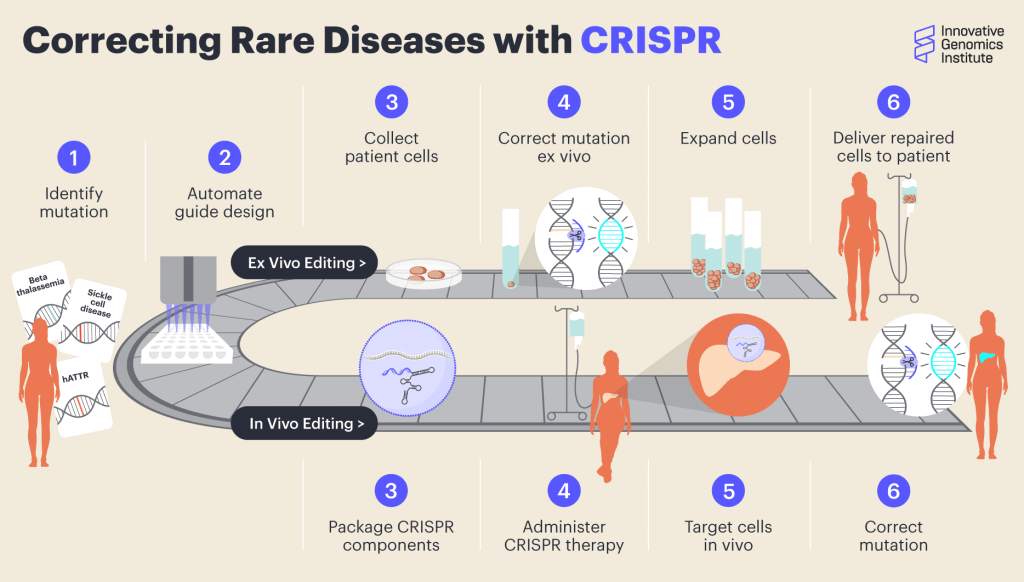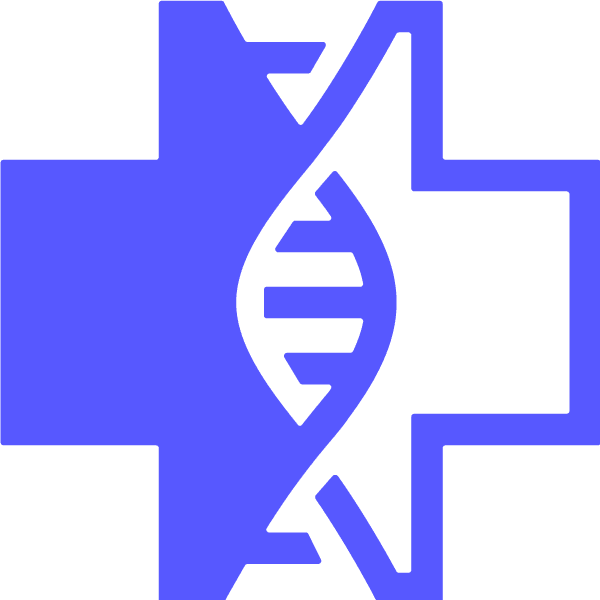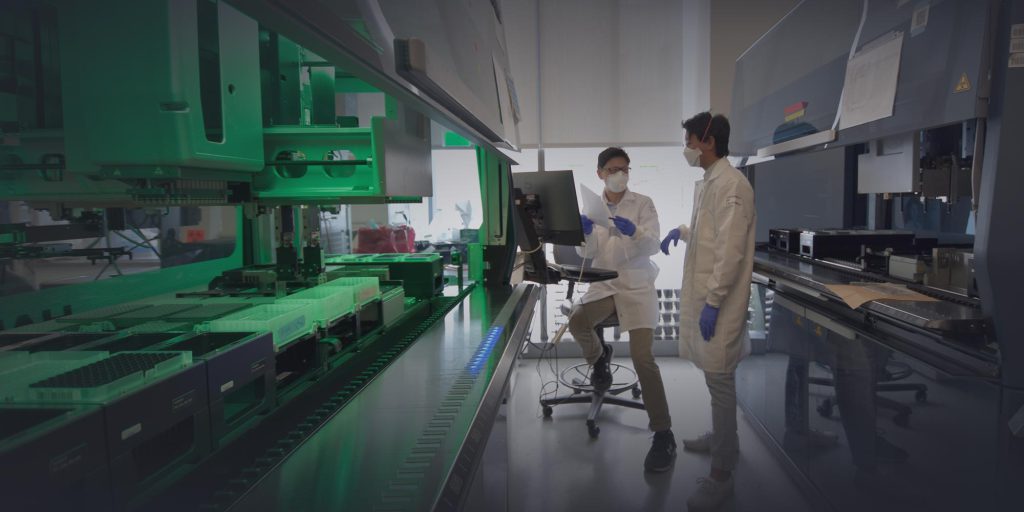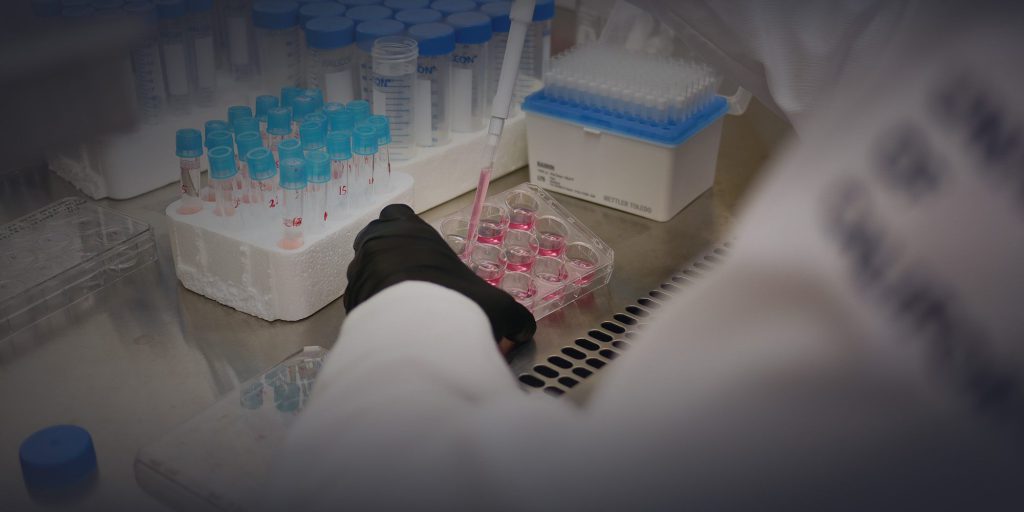Li Ka Shing Center for Translational Genomics
There are over 7000 known genetic diseases caused by mutations in single genes affecting over 400 million people worldwide. The vast majority of these diseases have no approved treatment today. Under the current model, it can take a decade or more to develop each new therapy. We can do better.
The Li Ka Shing Center for Translational Genomics (CTG) is a first-of-its-kind innovation hub for development of targeted genome-editing treatments for unaddressed genetic diseases, housed at the Innovative Genomics Institute (IGI) on the UC Berkeley campus.
The CTG team is creating a platform to accelerate the discovery of new therapies, focusing on rare diseases that are typically neglected by the standard drug development process. The mission of the CTG is to shrink the diagnosis-to-cure timeline, and develop new genomic therapies where there are unmet needs.
A Platform for CRISPR Cures
Current approaches target one disease at a time, taking a decade or more per therapy, and typically focus on common diseases. The CTG aims to create ready-to-deploy treatments for entire classes of diseases, including ultra-rare diseases, enabled by the flexibility of CRISPR genome editing.
When developing CRISPR-based therapies for a genetic condition, most of the steps in developing a cure are the same. As an example, for blood or primary immune disorders, the patient’s blood stem cells are removed from the body, genetically edited using CRISPR, then returned to the patient. What changes is the guide RNA to target different regions of the genome.
The unique automated system at the CTG can rapidly identify the best place in a disease-causing gene to target with CRISPR tools. Our high-throughput screening approach can annotate all known genes involved in these diseases with optimized guide RNAs, which can be validated in organoid models. This system is adaptable to all genetic diseases, allowing the team at the CTG to develop approaches for multiple classes of disease simultaneously.

Automation
The laboratory for Advanced Translational Genetics (ATG) at the CTG develops and deploys scaled stem cell engineering workflows to elucidate molecular principles of human disease and discover novel therapeutic strategies.
The ATG lab’s automated tissue culture system (ATTIS) enables scaled genome editing projects to generate isogenic hPSCs carrying designer mutations. ATTIS is operated by a team of expert molecular biologists and automation engineers that streamlines the generation and analysis of the gene-edited hPSCs allowing a cell culture and editing pipeline that presents a throughput 20–50 times higher than currently accessible in manually conducted hPSC editing experiments.
Learn more about collaborating with the ATG >
The ATTIS in action in the ATG laboratory at the Innovative Genomics Institute
INGENUITI Research Study

The Interventional Genomics Unit for Therapeutic Innovation (INGENUITI) is an initiative at the Innovative Genomics Institute to study the mechanisms underlying how genomic variants can cause disease and how gene editing tools like CRISPR-Cas9 could be used to treat those diseases.We are actively recruiting participants for this study, which you can read more about here. If you’re interested, you can email ingenuiti@berkeley.edu, and an investigator will get back to you.
CTG Publications
Functional annotation of variants of the BRCA2 gene via locally haploid human pluripotent stem cells
Li H, Bartke R, Zhao L, Verma Y, Horacek A, Ben-Natan AR, Pangilinan GR, Krishnappa N, Nielsen R, and Hockemeyer D. Nature Biomedical Engineering
Peptide-mediated delivery of CRISPR enzymes for the efficient editing of primary human lymphocytes
Foss DV, Muldoon JJ, Nguyen DN, Carr D, Sahu SU, Hunsinger JM, Wyman SK, Krishnappa N, Mendonsa R, Schanzer EV, Shy BR, Vykunta VS, Allain C, Li Z, Marson A, Eyquem J, and Wilson RC. Nature Biomedical Engineering
Pediatric Sarcomas: The Next Generation of Molecular Studies
Giannikopoulos P and Parham DM. MDPI Cancers
High-level correction of the sickle mutation is amplified in vivo during erythroid differentiation
Magis W, DeWitt MA, Wyman SK, Vu JT, Heo S-J, Shao SJ, Hennig F, Romero ZG, Campo-Fernandez B, Said S, McNeill MS, Rettig GR, Sun Y, Wang Y, Behlke MA, Kohn DB, Boffelli D, Walters MC, Corn JE, and Martin DIK. iScience
Connected Research Centers
Careers & Contact
To learn about open positions at the IGI and CTG, see our Careers page.
For any inquiries about the CTG’s ongoing work or potential partnerships, please contact Madalyn Lesman at mlesman@berkeley.edu.



